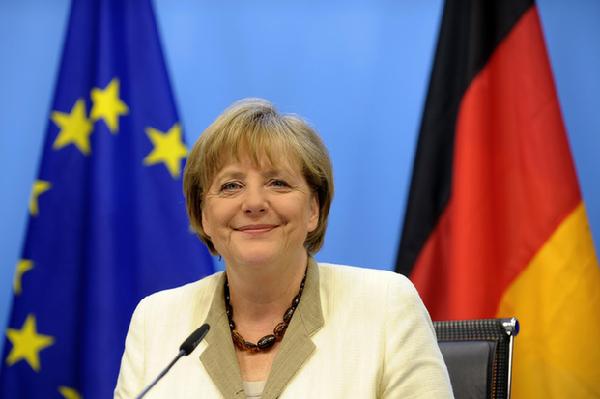Center
Europe agrees sweeping new action on debt crisis
Updated: 2011-07-22 10:28
(Agencies)
LOAN TERMS
The second bailout of Greece, details of which are likely to be set formally in September, will supplement a 110 billion euro rescue plan for the country launched by the European Union and the International Monetary Fund in May last year.
Among other steps, the leaders agreed on Thursday to ease terms on bailout loans to Greece, Ireland and Portugal; maturities will be extended to 15 years from 7.5 and interest cut to around 3.5 percent from 4.5-5.8 percent now.
 |
|
Germany's Chancellor Angela Merkel speaks during a news conference at the European Council building at the end of an euro zone leaders crisis summit in Brussels July 21, 2011. [Photo/Agencies] |
Banks and insurers will voluntarily swap their Greek bonds for longer maturities at lower interest rates to help Athens. Acknowledging that the swap scheme may lead to Greece being declared in selective default, Sarkozy said euro zone nations stood ready to protect Greek banks from the fallout, by providing credit guarantees if needed to ensure they can still obtain liquidity from the European Central Bank.
The region's rescue fund, the European Financial Stability Facility, will be allowed to buy bonds in the secondary market if the ECB deems that necessary to fight the crisis.
It will also be allowed for the first time to give states precautionary credit lines before they are shut out of credit markets, and lend governments money to recapitalise banks -- both moves which Germany blocked earlier this year.
The expanded EFSF role is designed to prevent bigger euro zone states such as Spain and Italy from being excluded from markets because of fears of a weaker country defaulting.
"We have agreed to create the beginnings of a European Monetary Fund," Sarkozy said of the EFSF's new powers.
In addition, the leaders promised a "Marshall Plan" of European public investment to help revive the Greek economy, which is in a deep recession due to draconian austerity steps imposed by the EU and the IMF. They did not give details.
The euro and European stocks rallied sharply on news of the emerging deal. The Stoxx European banking index closed Thursday up 4.1 percent and the insurance index gained 3.0 percent. Italian and Spanish shares rose strongly.
The risk premiums which investors demand to hold peripheral euro zone government bonds rather than benchmark German Bunds fell to two-week lows as expectations of a bolder-than-expected Brussels deal took hold.
"It really shows, in the 11th hour, leadership from the euro zone leaders," said Niels From, chief analyst at Nordea.
But Win Thin, global head of emerging markets strategy at Brown Brothers Harriman in New York, said: "This is really just kicking the can down the road.
"These countries need a serious hard restructuring. I do not think this is going away, and debt swaps rarely work."
ACCORD
Four options will be offered to private sector creditors taking part in the plan: three offers to exchange Greek government bonds and one offer to roll over Greek bonds into debt with maturities of up to 30 years. In addition, there will be a bond buyback scheme.
The Institute of International Finance, which represents over 400 firms and led talks for the private sector, said the bond exchanges would help reduce Greece's 340 billion euro debt pile by 13.5 billion euros. It predicted a 90 percent take-up rate by investors; several sources said the resulting net contribution would mean a write-down of about 20 percent on the value of banks' Greek bond holdings.
The summit accord was based on a common position crafted by German Chancellor Angela Merkel and Sarkozy in late night talks in Berlin on Wednesday with ECB President Jean-Claude Trichet.
In an apparent trade-off for Merkel's willingness to embrace new powers for the EFSF, Sarkozy agreed that private sector bondholders should take a hit and dropped a French call for a tax on banks to help fund the second Greek bailout.
The ECB relented and signalled it was willing to let Greece default temporarily under the plan, although Trichet told reporters he did not want to prejudge whether that would occur.
The expansion of the EFSF's role will have to be endorsed by national parliaments in the euro zone, but diplomats said critical lawmakers in Germany, the Netherlands and Finland were likely to back it since the private sector will share the burden of the new Greek rescue.
Thursday's summit is unlikely to mark a quick or complete resolution of the Greek crisis, however, as Merkel herself acknowledged earlier this week. Unless the country returns quickly to strong economic growth, which analysts believe is unlikely, a tougher decision may have to be made down the road on writing off more of its debt.
Some analysts also believe Ireland and Portugal may eventually have to restructure their sovereign debt, although EU officials insisted on Thursday that the Greek bond swap would not be used as a model for those two countries.
Many economists believe the only way out of the euro zone's debt crisis in the long run may be closer integration of national fiscal policies -- for example, a joint euro zone guarantee for countries' bonds, or issuance of a joint euro zone bond to finance all countries. Germany has opposed this.
The path to Thursday's agreement was made more difficult by competing national interests and domestic political agendas, and the unwieldy nature of the euro zone decision-making.
Sarkozy said after the summit that France and Germany would make proposals by the end of August on how to improve the governance of the bloc, to "clarify our vision of the future of the euro zone".
E-paper

Ringing success
Domestic firms make hay as shopping spree by middle class consumers keeps cash registers ringing in Nanjing
Mixed Results
Crowning achievement
Living happily ever after
Specials

Ciao, Yao
Yao Ming announced his retirement from basketball, staging an emotional end to a glorious career.

Going the distance
British fitness coach comes to terms with tragedy through life changes

Turning up the heat
Traditional Chinese medicine using moxa, or mugwort herb, is once again becoming fashionable
